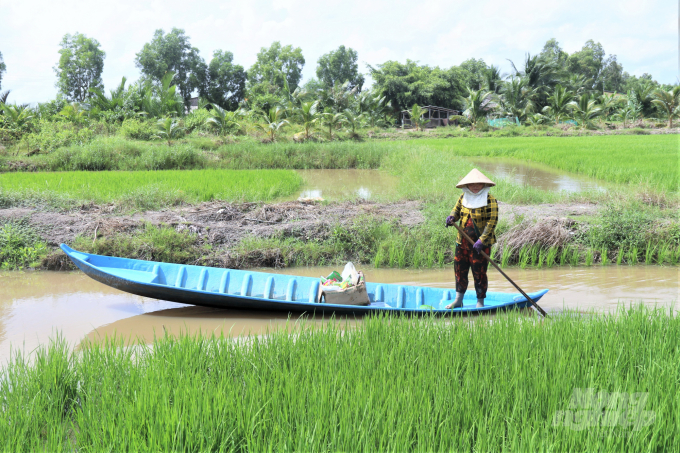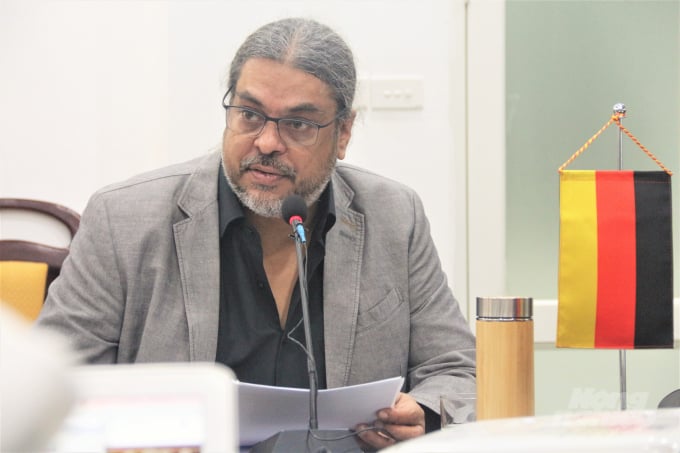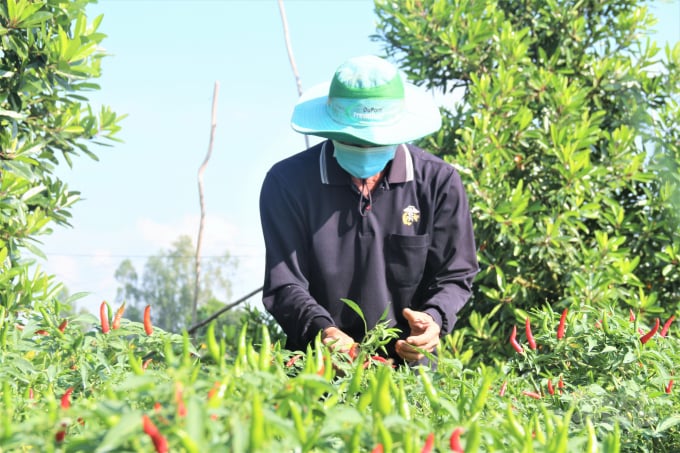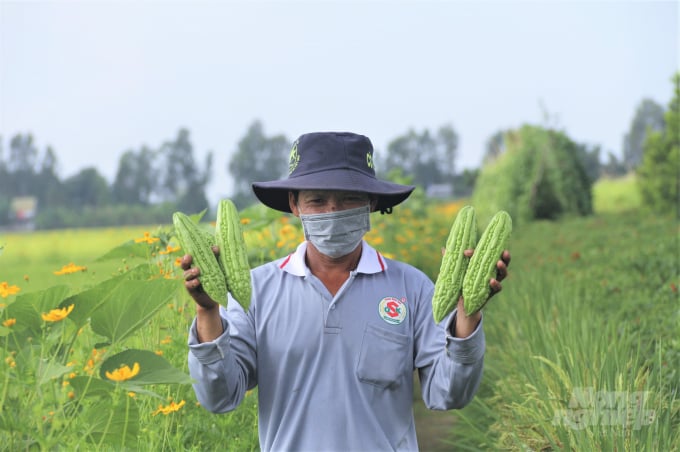June 22, 2025 | 16:12 GMT +7
June 22, 2025 | 16:12 GMT +7
Hotline: 0913.378.918
June 22, 2025 | 16:12 GMT +7
Hotline: 0913.378.918

Farmers in the Mekong Delta are facing extreme weather: floods, droughts, saltwater intrusion, etc. Photo: Pham Hieu.
Sharing with Vietnam Agriculture Newspaper about challenges from climate change in the Mekong Delta region, Mr. Oemar Idoe, Group Leader of Projects on Agriculture, Environment, Climate Change and ASEAN Economic Integration (GIZ), said that the first issue that requires attention is the sea level rise.
“We have long been witnessing the consequences of this problem such as coastal erosion, extreme weather, floods, droughts, saltwater intrusion, etc. And the impacts are becoming more and more severe,” he said.
Mekong Delta also suffers from land subsidence. The reason comes from the over-exploitation of groundwater and natural resources plus different land use purposes (urban development, production development, etc.) which affect the soil as well as the ecosystem of the Mekong Delta. All these factors have a close interaction, even aggravate each other.
In order to prove this claim, Mr. Oemar Idoe gave an example of sea level rise and land subsidence simultaneous occurrence causing the amount of salt water to overflow into the land, or hydropower projects built in the upper Mekong River limiting the amount of water flowing downstream.
The sea level rise still occurs, causing water shortage, reducing alluvial deposits, making saline intrusion in the Mekong Delta more severe.
“The rampant exploitation of sand will cause the phenomenon of ‘rivers that thirst’. When mud and sediment from upstream do not return or return but with more limited amount, the river water will have less silt, the speed and natural flow of the rivers will be affected, causing riverbank erosion,” said the GIZ Group Leader.

Mr. Oemar Idoe, Group Leader of Projects on Agriculture, Environment, Climate Change and ASEAN Economic Integration (GIZ). Photo: Pham Hieu.
Mr. Oemar Idoe stated his view, “We will not be able to get good yields as well as high quality products if the water source becomes salty. The Mekong Delta region needs to make a transition in its production structure towards diversifying crops and developing other agricultural products than rice.”

The Mekong Delta region needs to make a transition in its production structure towards diversifying crops and developing other agricultural products than rice. Photo: Pham Hieu.
The GIZ representative said that farmers, especially smallholders, are the most vulnerable to climate change as they hold little options to change the production structure.
The “Green Innovation Centres for the Agriculture and Food Sector” in Vietnam (GIC Vietnam) hopes to support farmers improve their ability to adapt and cope with the effects of climate change by accessing new production techniques and methods, enhancing their farming capacity, agro-products quality and their market access.
“Considering the efforts of GIC Vietnam, we hold no ambition to invent new solutions and technologies. Vietnam has been accessing advanced technologies at the moment, so the project’s task is just to promote the adjustment of those technologies to suit local realities while increasing farmers' access to those solutions," said Mr. Oemar Idoe.
The project works closely with the private sector, promoting connections between farmers, cooperatives and private businesses to comprehensively develop all stages of the agricultural value chain.

Farmers' conventional production methods need to be combined with modern and advanced technical methods. Photo: Pham Hieu.
According to Mr. Le Duc Thinh, Director of the Department of Cooperatives and Rural Development (MARD), farmers in the Mekong Delta currently have many effective and sustainable production methods available in the context of non-traditional crises, epidemics, and climate change. Even so, these methods need to be combined with modern, advanced technical methods.
"Mekong Delta’s current state forces farmers to change production process and structure. The combination of methods to improve the value of the agricultural industry in general, and improve the income of farmers, the quality of agro-products and by-products in particular, is the goal that the project aims for,” said Mr. Le Duc Thinh.
The “Green Innovation Centres for the Agriculture and Food Sector” in Vietnam (GIC Vietnam) is a package of technical assistance commitments from the German Government, jointly implemented by the Department of Cooperatives and Rural Development (MARD), the German Corporation for International Cooperation (GIZ) and the authorities of six provinces including An Giang, Dong Thap, Can Tho, Hau Giang, Kien Giang and Soc Trang from 2020-2024. The total investment capital is 7 million euros.
Translated by Samuel Pham

(VAN) The waste of resources from agricultural by-products and the situation of counterfeit and poor quality goods in production causing losses of thousands of billions were pointed out by the National Assembly deputy.

(VAN) After 5 years of implementation, the CAI initiative has helped coffee growers change their farming practices, moving toward responsible agriculture that meets global export standards.

(VAN) The primary prerequisite for the comprehensive and robust integration of Vietnam's livestock sector into the global value chain is the establishment of a disease control system.

(VAN) The results of national programs are essential for establishing a contemporary livestock sector that is well-equipped to meet the demands of both domestic and international markets, with robust biosafety standards.

(VAN) The UNESCO Global Geopark revalidation of Non nuoc Cao Bang and the transition to a two-tier administrative model are presently undergoing a pivotal moment in Cao Bang, the northernmost province of Vietnam.
/2025/06/13/5330-2-004539_953.jpg)
(VAN) Changing policy mindset and removing investment barriers are urgent requirements to open up new development space for enterprises in the agricultural sector.

(VAN) The areas include the restoration of five million hectares of marine ecosystems.